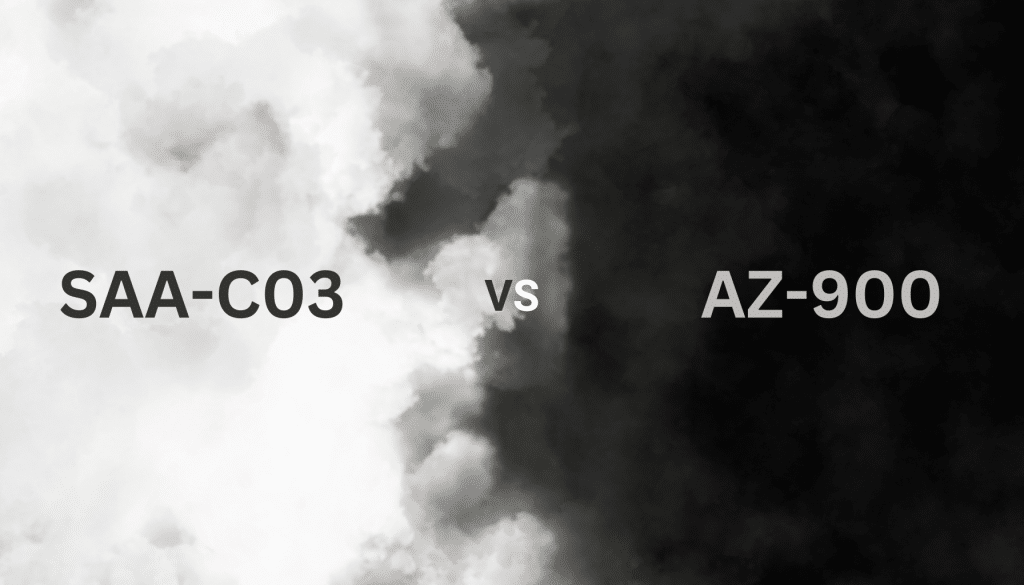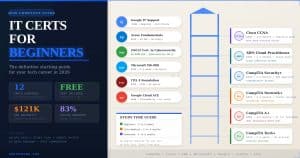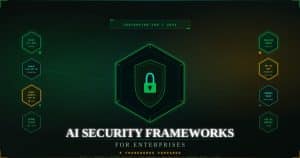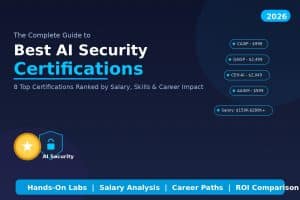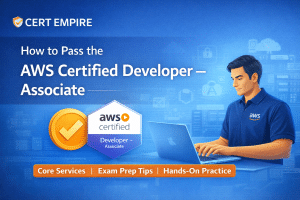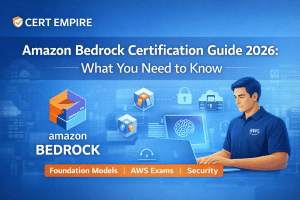Choosing the right cloud certification can feel overwhelming, especially when facing options like AWS Certified Solutions Architect – Associate (SAA-C03) and Microsoft Azure Fundamentals (AZ-900). Both certifications offer great opportunities, but which one is the better fit for you? Whether you’re starting your cloud journey or looking to advance your career, understanding the differences between these two popular certifications is key to making an informed decision.
This guide will break down everything you need to know about SAA-C03 and AZ-900, covering difficulty levels, career opportunities, salary potential, and more.
SAA-C03 vs AZ-900 Certification Comparison
| Criteria | SAA-C03 (AWS Certified Solutions Architect – Associate) | AZ-900 (Microsoft Azure Fundamentals) |
| Certification Level | Associate (Intermediate) | Fundamental (Beginner) |
| Target Audience | IT professionals, cloud architects, developers, system administrators | Beginners, business professionals, students |
| Difficulty Level | Moderate to High | Low |
| Exam Duration | 130 minutes | 60 minutes |
| Number of Questions | 65 | 40-60 |
| Question Types | Multiple choice, multiple response, scenario-based | Multiple choice, drag-and-drop, true/false |
| Passing Score | 720/1000 | 700/1000 |
| Validity Period | 3 years | No expiration (subject to updates) |
| Cost (Approx.) | $150 USD | $99 USD |
| Recommended Experience | 1+ years of AWS experience, hands-on practice | No prior experience needed |
| Key Topics Covered | Cloud architecture, security, networking, cost optimization | Cloud concepts, Azure pricing, compliance |
| Ideal For | Individuals looking for technical, hands-on cloud roles | Non-technical professionals, cloud beginners |
| Career Opportunities | Cloud Solutions Architect, Cloud Engineer, DevOps Engineer | Cloud Sales, Business Analyst, IT Support |
| Market Demand | High in startups, enterprises, and tech-driven companies | High in enterprise and government sectors |
| Study Resources | AWS Training, A Cloud Guru, Udemy, AWS Free Tier Hands-on | Microsoft Learn, Udemy, practice exams |
| Hands-on Required? | Strongly recommended | Optional |
| Potential Salary Impact | Higher earning potential in technical roles | Entry-level salary impact, modest boost |
| Best for Multi-Cloud Approach | Useful as a technical core certification | Good for general cloud awareness |
SAA-C03 vs AZ-900: Which Suits Your Career Path?
Let’s be real, these certs aren’t direct competitors. They focus on different cloud providers and target different audiences. But understanding their differences helps you pick the right one for your career goals.
AZ-900: This is an entry-level cert designed for people who want to understand cloud concepts without diving too deep. If you’re considering this certification, check out AZ-900 Certification: What You Need to Know to Get Started in Cloud Computing to learn about its key topics, study resources, and benefits.
SAA-C03: This cert goes beyond the basics. It’s for people who want to design solutions in AWS environments. You’ll need to understand cloud architecture, best practices, and how to build secure, scalable applications. If you’re planning a technical career in the cloud certified AWS, this one’s for you.
So, if you’re new to cloud, AZ-900 might feel easier to start with. But if you’re aiming to work hands-on with AWS tech, SAA-C03 is the better pick.
What SAA-C03 and AZ-900 Certifications Actually Cover
Both certifications aim to validate cloud skills, but they do it at different levels and for different platforms.
AZ-900 (Microsoft Azure Fundamentals)
- Purpose: AZ-900 is an introductory-level cert designed to provide a basic understanding of Microsoft Azure. It’s meant for individuals who are new to cloud computing or those in non-technical roles who need to understand cloud concepts.
- Key Areas Covered:
- Cloud Concepts: Covers general cloud principles like scalability, elasticity, and cost optimization.
- Core Azure Services: Introduces virtual machines, storage, networking, and databases on Azure.
- Pricing and SLAs: Helps you understand Azure’s cost management tools and service-level agreements.
- Security and Compliance: Provides an overview of Azure security measures and governance features.
- Use Cases: Helps in understanding when and why to use specific Azure services.
SAA-C03 (AWS Certified Solutions Architect – Associate)
- Purpose: SAA-C03 is a more advanced certification focused on designing and deploying scalable applications on AWS. It’s ideal for professionals with some cloud experience who want to specialize in AWS architecture.
- Key Areas Covered:
- AWS Architectural Principles: Emphasizes designing secure, cost-effective, and scalable solutions.
- Compute Services: Covers EC2, Lambda, and container services like ECS and EKS.
- Storage Solutions: In-depth understanding of S3, EBS, and database services.
- Networking: VPC, security groups, load balancing, and content delivery.
- Security Best Practices: Encryption, identity management (IAM), and compliance frameworks.
- Cost Optimization: Learning how to select the right AWS services while keeping costs low.
For a complete breakdown of exam structure, domains, and preparation strategies, see our SAA-C03 Certification Exam Guide.
AWS vs Azure: Which Cloud Provider Suits Your Needs?
Choosing between AWS and Azure isn’t just about the certification—it’s about which cloud provider aligns better with your career aspirations and job opportunities. Both platforms are widely used, but they have some differences that could influence your choice.
AWS (Amazon Web Services)
- Market Share: AWS has been the leader in cloud computing for years and is widely adopted across various industries.
- Strengths:
- Rich set of services and tools for developers and enterprises.
- Strong focus on infrastructure-as-a-service (IaaS) and platform-as-a-service (PaaS).
- Extensive global reach and availability zones.
- Strong support for startups and enterprises needing scalable solutions.
- Ideal For:
- Those looking to work with enterprises that rely on AWS.
- Developers and architects who want to build cloud-native applications.
- People interested in deep technical roles in cloud engineering.
Azure (Microsoft Cloud Platform)
- Market Share: Azure has been growing rapidly, especially among businesses already using Microsoft products.
- Strengths:
- Seamless integration with existing Microsoft tools (Office 365, Active Directory, etc.).
- Strong presence in government and enterprise sectors due to compliance offerings.
- Great hybrid cloud solutions with on-premises integration.
- AI and data analytics services are robust and evolving.
- Ideal For:
- Those working in organizations that are already invested in Microsoft technologies.
- IT professionals in enterprise environments who want to focus on hybrid cloud models.
- Business roles needing an understanding of cloud services without heavy technical depth.
Which Cloud Is More Popular?
AWS leads globally in market share, but Azure is widely used in corporate environments. If you’re planning to work with enterprises that use Microsoft tech stacks, Azure might be the better choice. If you’re looking at tech-driven startups or companies that need high scalability, AWS could be a better fit.
Certification Focus: Fundamentals vs Associate-Level Expertise
One of the biggest differences between AZ-900 and SAA-C03 is the level of knowledge required.
AZ-900: A Starting Point
- Skill Level: Beginner
- Who Should Take It?
- Absolute beginners with no prior cloud knowledge.
- Non-technical roles like sales, marketing, or project management teams.
- IT professionals wanting to learn Azure basics before moving to advanced certs.
- Exam Structure:
- Questions mostly focus on concepts, not practical scenarios.
- Multiple-choice questions based on general cloud services and terminology.
- Difficulty: Low – it’s mostly theoretical, and hands-on experience is optional.
SAA-C03: For Tech-Savvy Individuals with Cloud computing services
- Skill Level: Intermediate to Advanced
- Who Should Take It?
- IT professionals with some cloud knowledge.
- Developers, architects, and engineers wanting to work with AWS services.
- Those aiming for technical roles that involve cloud solution design.
- Exam Structure:
- Scenario-based questions requiring in-depth AWS knowledge.
- Hands-on experience is crucial for understanding real-world applications.
- Difficulty: Moderate to High – requires more preparation and hands-on practice.
Key takeaway:
If you’re new to a cloud computing career, AZ-900 gives a solid foundation without diving too deep. If you want to pursue technical roles, SAA-C03 demands more effort but offers greater rewards.
Who Should Go for SAA-C03?
Choosing the AWS Certified Solutions Architect – Associate (SAA-C03) isn’t for everyone. It’s not an entry-level cert that gives you just a surface-level understanding of cloud concepts. Instead, it dives deeper into AWS services and how they fit together to build reliable, scalable, and cost-effective cloud solutions.If you’re thinking about whether this certification is the right fit for you, it’s important to consider your current skills, career goals, and technical interests. You can explore more about the exam format, difficulty, and career impact in AWS SAA-C03 Certification Exam: What You Need to Know in 2026.
Ideal Candidates for the AWS Certified Solutions Architect – Associate
If you fall into one of these categories, SAA-C03 could be a smart move for your career:
- IT Professionals Looking to Specialize in AWS:
If you already have experience working in IT—whether it’s networking, system administration, or software development—and you want to focus on AWS, this cert can help you pivot toward cloud architecture roles. - Developers Seeking Cloud Expertise:
For software developers, understanding how to deploy applications in the cloud is becoming essential. This certification helps developers learn how AWS services can support application deployment, scaling, and security. - System Administrators & DevOps Engineers:
Admins managing on-premises infrastructure can use this cert to transition into cloud-based systems. DevOps professionals can leverage their existing automation skills and align them with AWS cloud environments. - Solution Architects Wanting to Validate Their Skills:
If you’re already working as a solutions architect and have hands-on AWS experience, the SAA-C03 is a way to formally validate your expertise and increase credibility with employers and clients. - Individuals with Basic Cloud Knowledge:
If you’ve already covered fundamental cloud concepts (e.g., through AZ-900 or AWS Cloud Practitioner), and you’re ready to go deeper, SAA-C03 is the next logical step. - Freelancers & Consultants:
Those working on cloud consulting projects or offering freelance services can use this cert to demonstrate their ability to design AWS-based solutions for clients.
Who should probably NOT take it yet?
If you’re completely new to cloud computing or lack experience in IT, jumping straight into SAA-C03 might feel overwhelming. Starting with the AWS Certified Cloud Practitioner (CLF-C02) could be a better foundation before moving into a cloud solution environment and architecture. Learn more about CLF-C02 exam here: https://certempire.com/aws-cloud-practitioner-certification-exam/
Key Technical Skills Required
Before attempting SAA-C03, you should have a good grasp of several key cloud concepts and AWS-specific services. Here’s a breakdown of what’s expected:
AWS Core Services Knowledge:
You should know how to work with AWS services such as:
- Compute: EC2, Lambda, Auto Scaling
- Storage: S3, EBS, Glacier
- Networking: VPC, Route 53, CloudFront
- Databases: RDS, DynamoDB, Aurora
- Security: IAM, KMS, AWS Shield, Security Groups
Cloud Architecture Fundamentals:
- Understanding of distributed systems, microservices, and serverless architectures
- Knowledge of high availability and disaster recovery strategies
- Experience with designing scalable, fault-tolerant solutions
Cost Optimization Strategies:
- Selecting the right instance types and pricing models (on-demand, reserved, spot)
- Using AWS cost management tools like Cost Explorer and Budgets
Security Best Practices:
- Applying the principle of least privilege
- Implementing security at different layers (network, application, data)
- Knowledge of compliance frameworks like HIPAA, GDPR, and AWS Well-Architected Framework
Monitoring and Logging:
- Familiarity with CloudWatch, CloudTrail, and AWS Config for tracking resource usage and security compliance
Automation & Infrastructure as Code (IaC):
- Experience with AWS CloudFormation or Terraform to deploy cloud infrastructure as code
- Understanding of CI/CD pipelines with AWS services like CodePipeline and CodeDeploy
Hands-on Experience is Key:
AWS recommends at least one year of hands-on experience working with AWS solutions before attempting the exam. If you’re looking for realistic practice questions, SAA-C03 exam dumps can help reinforce key concepts and exam strategies. Additionally, Cert Empire offers high-quality exam dumps to help you prepare with real exam-like questions.
If you’re actively preparing, follow our step-by-step How to Pass the AWS SAA-C03 Exam guide for proven study methods and practical tips.
How SAA-C03 Aligns with Long-Term Career Goals in the AWS Ecosystem
Getting the SAA-C03 certification isn’t just about passing an exam, it’s about setting yourself up for a long-term career in cloud computing. Here’s how this five top cloud computing skills and certifications can help you grow within the AWS ecosystem:
1. A Stepping Stone to Advanced AWS Certifications
The SAA-C03 cert is a foundation for more advanced AWS certs, such as:
- AWS Certified Solutions Architect – Professional (SAP-C02): For designing complex, multi-tier cloud applications.
- AWS Certified DevOps Engineer – Professional: Focused on automation and deployment strategies.
- AWS Certified Security – Specialty: Diving deep into cloud security best practices.
If you’re planning to specialize in AWS, SAA-C03 is a solid first step.
2. Expanding Career Opportunities
Holding this cert can open doors to roles such as:
- AWS Cloud Solutions Architect
- Cloud Engineer
- AWS Consultant
- DevOps Engineer
- Systems Architect
With cloud adoption increasing across industries, AWS-certified professionals are in high demand globally. Companies are willing to pay a premium for candidates who can confidently design and manage AWS solutions.
3. Higher Salary Potential
AWS-certified professionals, especially those with the Solutions Architect cert, tend to command higher salaries. According to industry reports, individuals with this certification earn between $100,000 and $150,000 per year, depending on experience and location.
4. Recognition and Credibility
AWS is the market leader in cloud services, and being certified as an architect instantly boosts your credibility. Whether you’re applying for a job or working as a consultant, having an AWS cert adds weight to your profile and reassures employers of your capabilities.
5. Staying Competitive in the Job Market
Cloud technology is evolving rapidly. Staying AWS-certified ensures you’re up to date with the latest trends and advancements in cloud architecture. It also gives you an edge over candidates who only have theoretical knowledge aws technology but lack certification.
6. Multi-Cloud Expertise
Even if you plan to pursue certifications in other cloud platforms (like Azure or Google Cloud), having AWS knowledge helps you understand cloud concepts that are applicable across different providers.
For deeper insights into earning potential, check out our Job Trends and Salaries for AWS SAA-C03 analysis, based on real industry data.
Why AZ-900 Might Be the Right Fit for You
If you’re thinking about stepping into the world of cloud computing but feel overwhelmed by the complexity of it all, AZ-900: Microsoft Azure Fundamentals might be the perfect starting point. It’s designed to make cloud concepts easy to grasp, especially for those with little to no technical background. Whether you’re aiming for a cloud-related career or just want to understand how Azure works, this certification provides a solid introduction without diving too deep into the technical side.
Microsoft Certified Azure Fundamentals
Azure is Microsoft’s cloud platform, offering a wide range of services like virtual machines, databases, storage, and AI solutions. With AZ-900, Microsoft has created an entry-level certification that explains cloud basics in a way that’s easy to understand, even if you’re not from a tech background.
Instead of jumping straight into coding or complex cloud architectures, Azure resources focuses on:
- Cloud Concepts: What the cloud is, why it’s useful, and how it helps businesses grow.
- Core Azure Services: A look at different services like storage, compute, and networking without getting too technical.
- Security, Compliance, and Trust: How Azure keeps data safe and follows global compliance rules.
- Azure Pricing and Support: Understanding how Microsoft charges for cloud services and what support options are available.
In short, AZ-900 helps you get familiar with cloud computing without the pressure of learning too many technical details all at once. It’s a “big picture” cloud computing certifications that lays the foundation for future learning.
Who Benefits the Most from an Entry-Level Cloud Certification?
Not everyone needs deep technical cloud knowledge. Some people just need to understand cloud concepts enough to work alongside technical teams or make informed business decisions. Here’s who can benefit the most from AZ-900:
1. Beginners Exploring Cloud Careers
If you’re completely new to IT or cloud technology, AZ-900 is a great place to start. It helps you get comfortable with basic google cloud technologies and ideas before moving on to more technical certifications like AZ-104 (Azure Administrator Associate) or AZ-305 (Azure Solutions Architect Expert).
2. Non-Technical Professionals
Roles in sales, marketing, finance, or project management often require a basic understanding of the leading cloud computing platforms. AZ-900 provides enough knowledge to:
- Speak confidently with technical teams.
- Understand cloud solutions and how they impact business operations.
- Evaluate cloud services from a business perspective.
3. IT Professionals Seeking Cloud Familiarity
System admins, network engineers, and even software developers who work with on-premise systems can use AZ-900 to get familiar with Azure services. It serves as an excellent starting point before diving into advanced cloud engineering roles.
4. Business Decision Makers
Managers, directors, and C-level executives who want to explore cloud solutions for their business can benefit from this certification. It helps them understand cloud capabilities and pricing models so they can make informed strategic decisions.
5. Students and Recent Graduates
If you’re fresh out of college and looking to boost your resume, AZ-900 is a great way to show employers that you’re familiar with cloud fundamentals, even if you don’t have work experience yet.
6. Freelancers and Consultants
Those who offer IT consulting services or freelance work design infrastructure solutions can use AZ-900 to broaden their knowledge and advise clients on Azure-based solutions without needing deep technical expertise.
Comparing the Complexity of SAA-C03 vs AZ-900
AZ-900: A Simpler Starting Point
AZ-900 is an entry-level certification that focuses on foundational cloud concepts without diving into hands-on technical details. For structured exam practice, AZ-900 exam dumps offer a great way to familiarize yourself with the question format and key topics.
Complexity level: Low
- Focuses on conceptual knowledge rather than deep technical implementation.
- Questions are mostly theoretical, covering definitions, benefits, and high-level overviews of Azure services.
- No coding or hands-on experience is required.
Who finds it easy?
- Beginners with no cloud background.
- Business and non-technical professionals.
- Students or recent graduates looking for basic cloud exposure.
SAA-C03: A Bigger Challenge
The AWS Certified Solutions Architect – Associate (SAA-C03) is a much more challenging certification, aimed at IT professionals with some experience in cloud environments. Unlike AZ-900, it requires a solid understanding of AWS services and how they interact in real-world scenarios.
Complexity level: Moderate to High
- Requires knowledge of architectural best practices, deployment strategies, and security considerations.
- Exam questions are scenario-based, requiring analytical thinking and the ability to choose the best AWS solutions for different use cases.
- Hands-on experience is highly recommended, as theoretical knowledge alone might not be enough to pass.
Who finds it challenging?
- Beginners with no google cloud platform experience.
- Those unfamiliar with AWS services and cloud architecture.
- IT professionals who focus on traditional (on-premise) infrastructure without cloud exposure.
Prerequisites You Should Know Before Taking the Exams
Though there are no formal prerequisites for either certification exam, your existing knowledge and experience will significantly impact your preparation time and exam success, plus, how will you manage azure compute resources.
What You Should Know Before Taking AZ-900:
- Basic understanding of what cloud computing is (e.g., what is SaaS, PaaS, IaaS).
- Familiarity with general IT concepts like networking, security, and data storage.
- Some awareness of Microsoft products and services, though it’s not mandatory.
Recommended for:
- Total beginners who want a smooth introduction to cloud computing.
What You Should Know Before Taking SAA-C03:
- Solid understanding of AWS core services like EC2, S3, RDS, and VPC.
- Experience with designing cloud solutions focusing on scalability, high availability, and cost-efficiency.
- Familiarity with cloud architecture frameworks and AWS Well-Architected Framework.
- Understanding of networking concepts such as subnets, VPNs, and security groups.
Recommended for:
- IT professionals with 1-2 years of experience in cloud or related roles.
- Those who have worked hands-on with AWS services or have done extensive labs and practical exercises.
Exam Format, Duration, and Difficulty Breakdown
Both AZ-900 and SAA-C03 exams have different formats, time limits, and question styles.
AZ-900 Exam Breakdown:
- Number of Questions: 40-60
- Exam Duration: 60 minutes
- Question Types:
- Multiple choice
- True/false
- Drag-and-drop matching
- Passing Score: 700 out of 1000
- Difficulty: Easy to moderate
- Cost: $99 USD
Key Challenges:
- Some tricky questions related to Azure pricing models and SLAs.
- Understanding cloud service models in a business context rather than technical depth.
SAA-C03 Exam Breakdown:
- Number of Questions: 65
- Exam Duration: 130 minutes
- Question Types:
- Multiple choice
- Multiple response
- Scenario-based problem-solving
- Passing Score: Around 720 out of 1000
- Difficulty: Moderate to high
- Cost: $150 USD
Key Challenges:
- Scenario-based questions that require deep analysis of AWS architecture.
- Questions covering multiple AWS services and their interconnections.
- Managing time effectively due to long, detailed scenarios.
SAA-C03 vs. AZ-900 Salary Trends in 2026
SAA-C03 is an associate-level certification focusing on designing and deploying scalable systems on AWS. Professionals holding this certification often step into roles such as AWS Solutions Architects, Cloud Engineers, or DevOps Engineers.
According to data from Whizlabs, AWS Solutions Architects command an average salary of approximately $143,000 annually. Entry-level professionals with less than two years of experience earn around $135,056 per year, while seasoned professionals with over 14 years of experience can earn up to $139,430 annually.
In contrast, AZ-900 is a foundational certification introducing basic cloud concepts and Azure services. It’s ideal for individuals new to cloud computing or those in non-technical roles. While specific salary data for AZ-900 certified professionals is limited, it’s important to note that this certification serves as a stepping stone to more advanced Azure certifications, which can significantly enhance earning potential.
For instance, Azure Cloud Architects earn around $120,275 compared to non-certified architects at $114,770. For Azure DevOps Engineers, certification leads to an average salary of $110,635, whereas their non-certified counterparts make around $105,441.
Regional Differences in Pay for Certified Professionals
Salaries for cloud professionals can vary based on geographic location due to factors like cost of living, demand for cloud services, and regional economic conditions. Here’s a snapshot of average annual salaries for AWS Certified Solutions Architects in different regions:
- United States: Approximately $143,000.
- India: Azure developers are compensated with an annual average salary of ₹1,400,000.
- United Kingdom: £35,000 – £55,000.
These figures illustrate that while certifications like SAA-C03 and AZ-900 are globally recognized, the financial benefits they confer can differ significantly based on location.
How Certification Level Influences Earning Potential
The level of certification plays a crucial role in determining earning potential:
- Fundamental-Level Certifications (e.g., AZ-900): These certifications provide a basic understanding of cloud concepts and are often pursued by individuals starting their cloud journey or those in non-technical roles. While they can enhance job prospects, the direct impact on salary is modest compared to higher-level certifications.
- Associate and Expert-Level Certifications (e.g., SAA-C03, AZ-305): These certifications require a deeper understanding of cloud services and are tailored for professionals aiming for roles like Solutions Architect or Cloud Engineer. Holding such certifications often correlates with higher salaries due to the advanced skills and expertise validated. For example, Azure Solutions Architects in the U.S. earn an average salary of $152,142.
| Certification | Average Annual Salary | Experience Level | Region |
| SAA-C03 | $143,000 | All levels | United States |
| SAA-C03 | $135,056 | Entry-level | United States |
| SAA-C03 | $139,430 | Senior-level | United States |
| AZ-900 | $80,000 – $116,500 | All levels | United States |
| AZ-900 | ₹600,000 – ₹1,000,000 | All levels | India |
| AZ-900 | £35,000 – £55,000 | All levels | United Kingdom |
Real-World Career Opportunities: Which One Opens More Doors?
When it comes to cloud certifications, choosing between SAA-C03 (AWS Certified Solutions Architect – Associate) and AZ-900 (Microsoft Azure Fundamentals) can directly impact your job prospects and career growth.
Both certifications cater to different audiences and skill levels, meaning they open different kinds of doors in the job market. Understanding where each certification fits in the industry will help you make a better decision.
Job Roles You Can Land with SAA-C03 vs AZ-900
Each certification prepares you for different types of roles within the cloud ecosystem. The AZ-900 is more of an introductory-level certification that leads to generalist roles, whereas SAA-C03 prepares you for specialized technical roles.
Career Opportunities with SAA-C03 (AWS Certified Solutions Architect – Associate):
With SAA-C03, you can land highly technical roles that require designing and implementing AWS-based solutions. Some of the popular job roles include:
- AWS Solutions Architect – Designing and deploying scalable, cost-effective AWS solutions for clients or internal teams.
- Cloud Engineer – Building and maintaining cloud infrastructure, including networking, security, and compute resources.
- DevOps Engineer – Automating deployments and managing AWS environments using infrastructure-as-code (IaC) tools.
- Systems Administrator – Managing cloud-based infrastructure and ensuring high availability.
- Security Engineer – Implementing AWS security best practices and monitoring systems for threats.
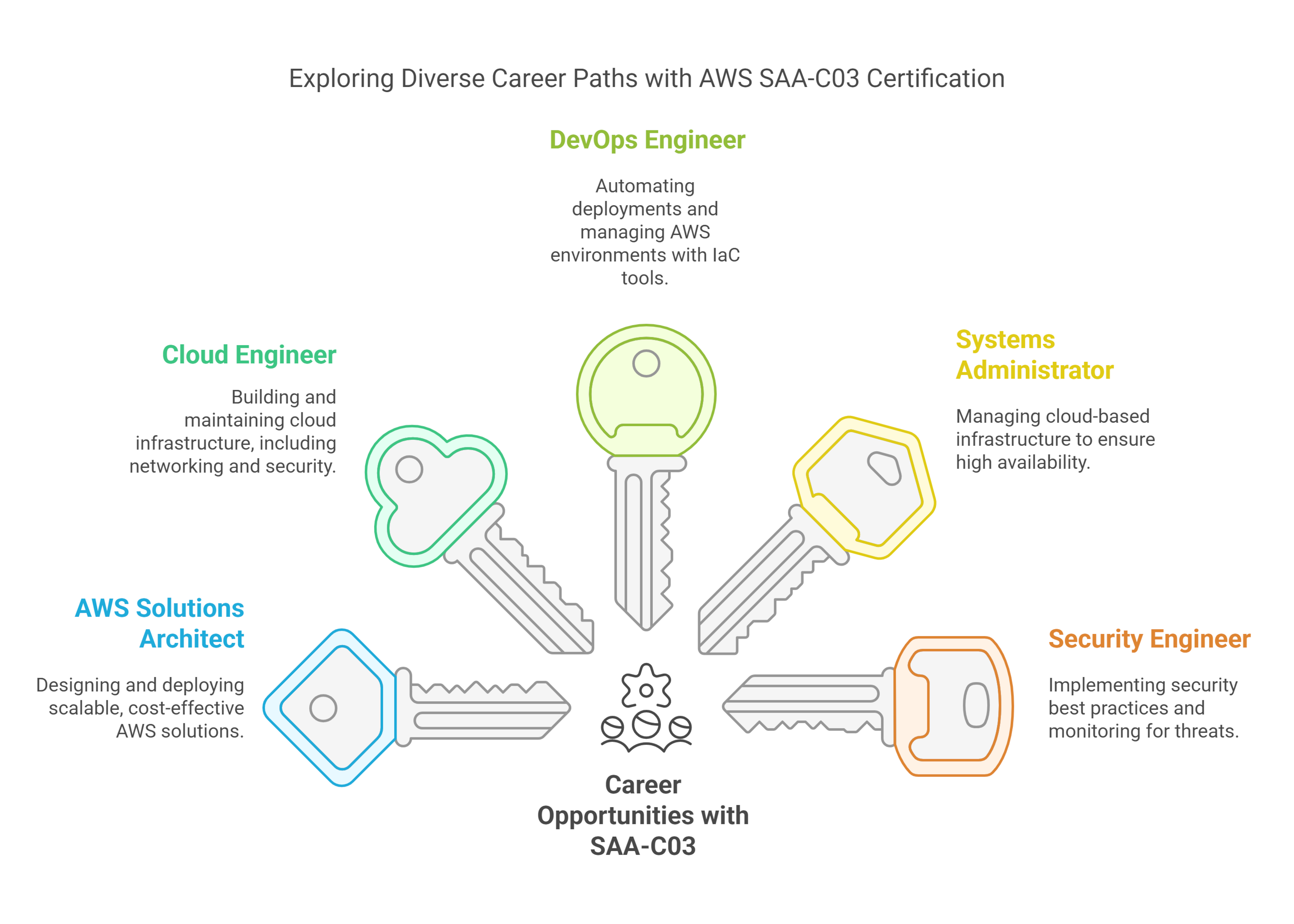
Career Opportunities with AZ-900 (Microsoft Azure Fundamentals):
AZ-900 is best suited for those looking to build a foundation in cloud and pursue general cloud-related roles or positions that don’t require deep technical expertise. Common roles include:
- Cloud Sales Specialist – Assisting organizations in understanding Azure services and selling cloud solutions.
- Project Manager (Cloud-related projects) – Managing cloud implementation projects without requiring deep technical expertise.
- IT Support Analyst – Providing support for cloud-based applications within an organization.
- Business Analyst (Cloud Focused) – Working on business strategies and cloud adoption plans.
- Entry-Level Cloud Practitioner – Helping businesses understand and adopt Azure services.
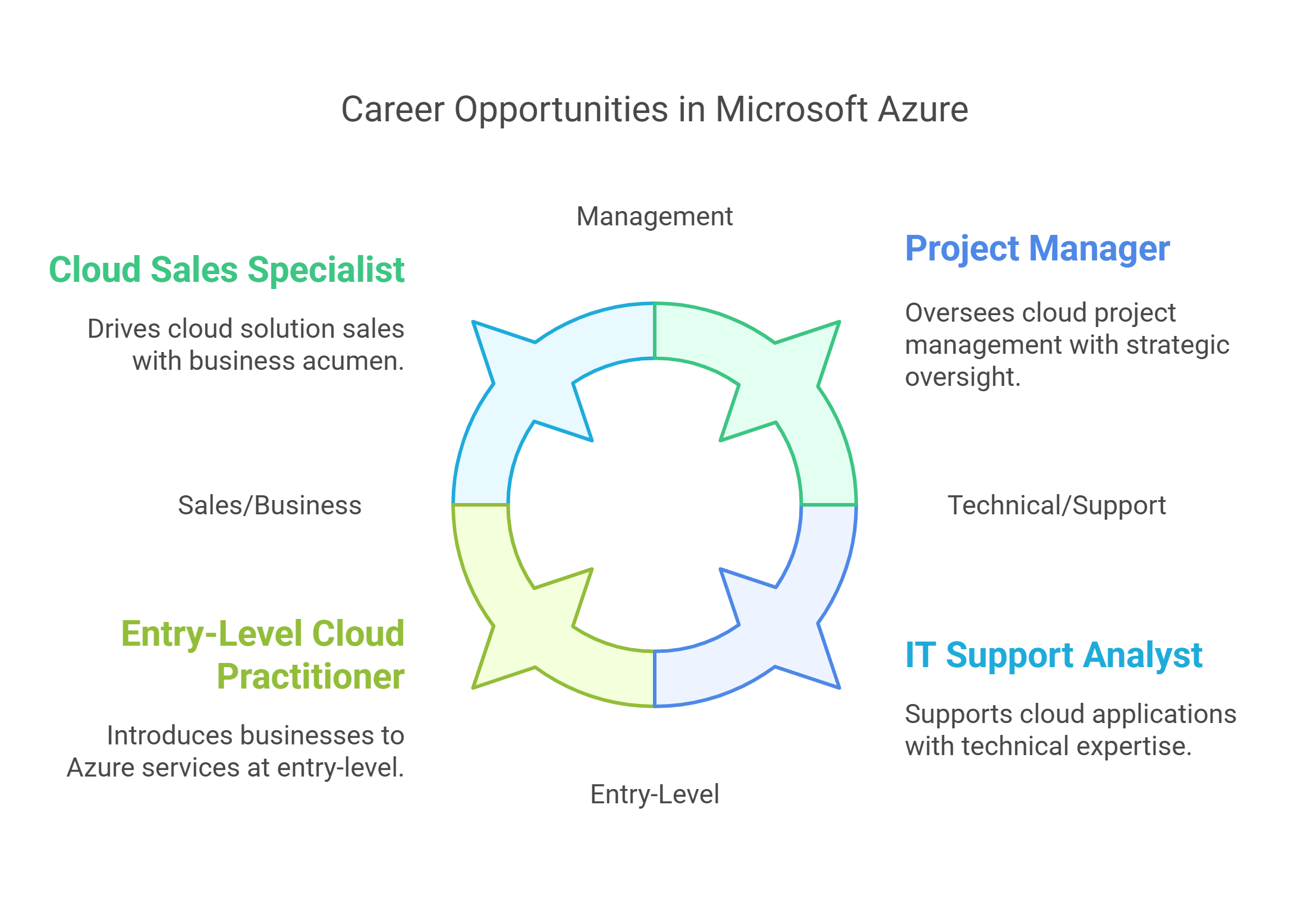
Key Difference:
- SAA-C03 leads to highly technical, hands-on roles.
- AZ-900 is better suited for those looking for business or entry-level cloud roles
Final Thoughts!
If you’re looking for an entry point into cloud computing and need foundational knowledge, AZ-900 is the right choice. It’s ideal for beginners and non-technical roles.
If you’re aiming for a technical, hands-on career in cloud solutions, SAA-C03 is the better option. It’s a valuable certification that can lead to high-paying roles and long-term growth in the AWS ecosystem.
Still unsure? Think about your current experience, career ambitions, and how much time you’re willing to invest. Choosing the right certification can open up exciting opportunities in the cloud industry

